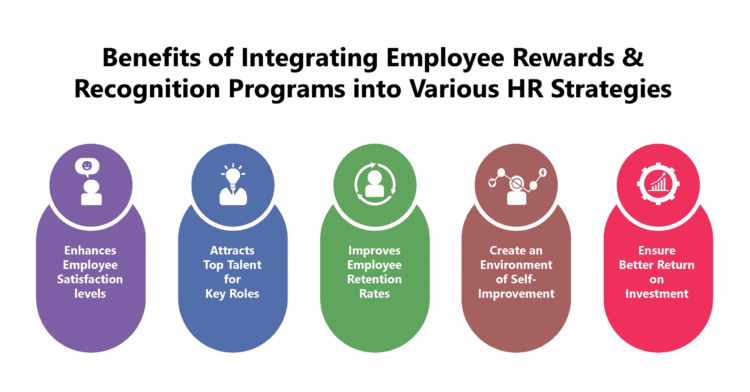1. Integrating employee recognition into HR strategy enhances employee satisfaction, loyalty, and productivity, creating a motivated workforce.
2. Fostering a culture of appreciation helps attract top talent, improve employee retention rates, and reduce turnover.
3. A recognition-focused HR strategy promotes self-improvement and healthy competition among employees.
4. This integration also ensures a better return on investment by maximizing the impact of employee development and engagement efforts.
In today’s hyper-competitive business environment, organizations must develop a highly efficient and motivated workforce to stay ahead. Hence, organizations need to make employee rewards and recognition integral to the HR strategy and culture,

Earlier HR teams were deeply involved in the day-to-day operations of employee rewards and recognition programs.
However, this facet of the HR function has also undergone significant changes over time.
The involvement of HR in deciding rewards and recognition has reduced over time. HR teams often shoulder a range of responsibilities.
So, they leave it to line managers to recognize and appreciate their teams in any way they feel appropriate without too much direct involvement.

HR teams play only a peripheral role in employee rewards and recognition. However, they must make these policies an integral part of the HR strategy.
Given its importance towards employee engagement, rewards and recognition need to be at the core of every HR strategy. Such an approach helps ensure the success of the HR teams in improving the overall engagement and motivation levels of employees.
So, here are the key benefits of integrating employee rewards and recognition programs into HR strategy:
1. Enhances Employee Satisfaction levels
2. Attracts Top Talent for Key Roles
3. Improves Employee Retention Rates
4. Creates an Environment of Self-Improvement
5. Ensures Better Return on Investment


When rewards and recognition become integral to HR policies, employees experience greater job satisfaction.
This happens as they receive proper and timely acknowledgment and appreciation for their efforts.
Hence, it helps in enhancing their happiness levels and motivates them to be more productive and efficient.
It also promotes a more profound sense of loyalty and belonging among employees as they feel valued by their organization.

Most top professionals today prefer to work for organizations where their commitment, skills, and efficiency are acknowledged and appreciated.
Hence, organizations with rewards and recognition as an integral part of their HR strategy are likely to attract top professionals.
Organizations with a global workforce can also benefit from such strategies.

Employee turnover is one of the significant HR challenges for organizations today. In many cases, poor rewards and recognition culture is one of the key reasons for high turnover rates.
So, by adopting an HR strategy with effective recognition policies, organizations can overcome this challenge and improve employee retention rates.
Hence, timely appreciation and rewards keep employees motivated, strengthen their bond with the organization, and minimize the chances of seeking other opportunities.

HR strategies that integrate reward and recognition create a work environment that inspires employees to develop an attitude of self-improvement.
Also, watching their peers get recognized can motivate other employees to improve their performance and get similar recognition.
It helps develop a culture of healthy competition among employees to achieve individual, team, and organizational growth objectives.

Most modern organizations, having a multicultural workforce, invest considerable time and effort in employee development and engagement.
However, the lack of a proper rewards and recognition policy reduces the impact of these efforts and return on investment.
Hence, integrating reward and recognition with key HR strategies enables organizations to get higher employee performance and efficiency.
Therefore, such strategies boost the workforce’s morale and maximize their contribution to the business’s success.
Integrating employee rewards and recognition with the HR strategy, helps organizations to achieve the objective of developing a talented and dedicated workforce committed to achieving organizational growth objectives.

Lead author: Sagar Chaudhuri, the Co-Founder and CEO of HiFives. He is an HR Tech Evangelist with over 25 years of corporate and entrepreneurship experience. In the past, Sagar has worked in leadership roles with companies such as Genpact, Infosys, and ICICI Bank. He has an engineering degree from IIT Kharagpur and an MBA from IIM Lucknow. Connect on LinkedIn
To stay updated on the latest HiFives blogs, follow us on Twitter (@MyHiFives)